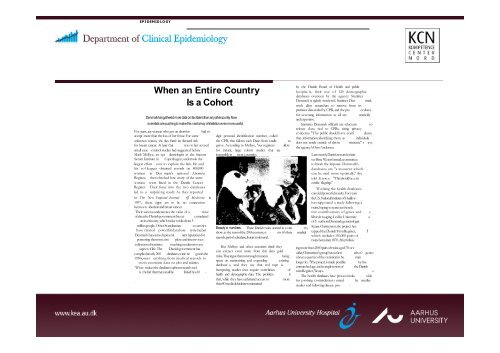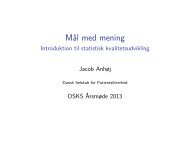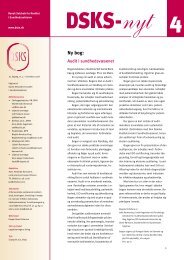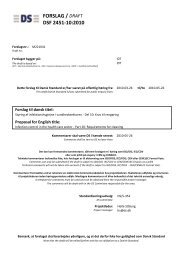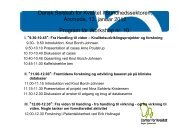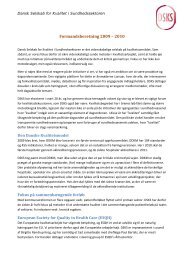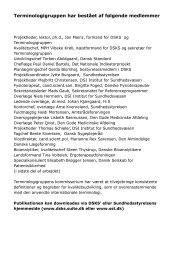Hvilke data er tilgængelige i dag, hvor gode er de - DSKS - Dansk ...
Hvilke data er tilgængelige i dag, hvor gode er de - DSKS - Dansk ...
Hvilke data er tilgængelige i dag, hvor gode er de - DSKS - Dansk ...
Create successful ePaper yourself
Turn your PDF publications into a flip-book with our unique Google optimized e-Paper software.
EP I DEMIO LO GY<br />
For years, any woman who got an abortion had to<br />
accept more than the loss of h<strong>er</strong> fetus: For some<br />
unknown reason, she also faced an elevated risk<br />
for breast canc<strong>er</strong>. At least that was w hat sev<strong>er</strong>al<br />
small case -control studies had suggested before<br />
Mads Melbye, an epi <strong>de</strong>miologist at the Statens<br />
S<strong>er</strong>um Institute in Copenhagen, und<strong>er</strong>took the<br />
largest effort ev<strong>er</strong> to explore the link. He and<br />
his col leagues obtained records on 400,000<br />
women in Den mark's national Abortion<br />
Regist<strong>er</strong>, then checked how many of the same<br />
women w<strong>er</strong>e listed in the Danish Canc<strong>er</strong><br />
Regist<strong>er</strong>. Their foray into the two <strong>data</strong>bases<br />
led to a surprising result: As they reported<br />
in The New England Journal of Medicine in<br />
1997, th<strong>er</strong>e appe ars to be no connection<br />
between abortion and breast canc<strong>er</strong>.<br />
Their success und<strong>er</strong>scores the value of a trove<br />
of <strong>data</strong> the Danish gov<strong>er</strong>nment has ac cumulated<br />
on its citizenry, which today totals about 5<br />
million people. Oth<strong>er</strong> Scandinavian countries<br />
have created pow<strong>er</strong>ful <strong>data</strong>base systems, but<br />
Denmark has earned a preemi nent reputation for<br />
possessing the most com plete and int<strong>er</strong>woven<br />
collection of statistics touching on almost ev<strong>er</strong>y<br />
aspect of life. The Danish gov<strong>er</strong>nment has<br />
compiled nearly 200 <strong>data</strong>bases, sonic be gun in the<br />
1930s, on ev <strong>er</strong>ything from medical records to<br />
socio economic <strong>data</strong> on jobs and salaries.<br />
What makes the <strong>data</strong>bases a phun research tool<br />
is the fact that they can all be linked by a 10 -<br />
.<br />
When an Entire Country<br />
Is a Cohort<br />
Denmark has gath<strong>er</strong>ed more <strong>data</strong> on its citizens than any oth<strong>er</strong> country. Now<br />
scientists are pushing to make this vast array of statistics even more useful<br />
digit p<strong>er</strong>sonal i<strong>de</strong>ntification numb<strong>er</strong>, called<br />
the CPR, that follows each Dane from cradle to<br />
grave. According to Melbye, "our regist<strong>er</strong>s allow<br />
for instant, large cohort studies that are<br />
impossible in most countries.<br />
Beauty in numb<strong>er</strong>s. These Danish twins starred in a vari ety<br />
show at the turn of the 20th century; n ow it's their medical<br />
records, part of a <strong>data</strong>base, that are in <strong>de</strong>mand.<br />
But Melbye and oth<strong>er</strong> scientists think they<br />
can extract even more from this <strong>data</strong> gold<br />
mine. They argue that not enough money is being<br />
spent on maintaining and expanding existing<br />
<strong>data</strong>base s, and they say that red tape is<br />
hamp<strong>er</strong>ing studies that require correlation of<br />
health and <strong>de</strong>mographic <strong>data</strong>. The problem is<br />
that, while they have unfett<strong>er</strong>ed access to more<br />
than 80 medical <strong>data</strong>bases maintained<br />
by the Danish Board of Health and public<br />
hospita ls, their use of 120 <strong>de</strong>mographic<br />
<strong>data</strong>bases ov<strong>er</strong>seen by the agency Statistics<br />
Denmark is tightly restricted. Statistics Den mark<br />
won't allow research<strong>er</strong>s to remove from its<br />
premises <strong>data</strong> co<strong>de</strong>d by CPR, and the pro cedures<br />
for accessing information at all are unwieldy<br />
and expensive.<br />
Statistics D<strong>er</strong>unark officials are reluctant to<br />
release <strong>data</strong> tied to CPRs, citing privacy<br />
conc<strong>er</strong>ns. "The public should have confi <strong>de</strong>nce<br />
that information i<strong>de</strong>ntifying them as individuals<br />
does not resi<strong>de</strong> outsi<strong>de</strong> of this in stitution," s ays<br />
the agency's Otto And<strong>er</strong>sen.<br />
Last month, Danish research minis<br />
t<strong>er</strong> Birte Weiss formed a committee<br />
to break the impasse. Denmark's<br />
<strong>data</strong>bases are "a resource which<br />
can be used more optimally," she<br />
told Science. "This should be a sci<br />
entific flagship."<br />
Working the health <strong>data</strong>bases<br />
can yield pow<strong>er</strong>ful results. For years<br />
the U.S. National Institutes of Health w<br />
has supported a study following z<br />
twins, hoping to tease out the rela<br />
tive contributions of genes and o<br />
lifestyle to aging. Led by Univ<strong>er</strong>sity a<br />
of S outh<strong>er</strong>n Denmark g<strong>er</strong>ontologist<br />
Kaare Christensen, the project has<br />
tapped the Danish Twin Regist<strong>er</strong>, f<br />
which inclu<strong>de</strong>s 110,000 pairs of<br />
twins born since 1870. Aft<strong>er</strong> follow<br />
ing more than 2000 pairs of twins aged 70 or z<br />
old<strong>er</strong>, Christensen's group has so far ti ed to 0 genes<br />
about a quart<strong>er</strong> of the variation in hu man<br />
longevity. "The project is ma<strong>de</strong> possible by the<br />
unmatched age and completeness of the Danish<br />
twin Regist<strong>er</strong>," lie says. o<br />
The health <strong>data</strong>bases have proven invalu able<br />
for probing contradictions raised by small<strong>er</strong><br />
studies and following disease pro -


